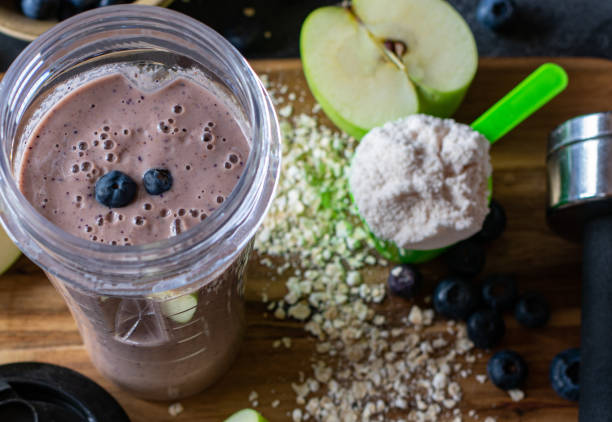The Effect of Protein Shakes on Your Blood Pressure

Beverages supplemented by whey-based protein can significantly reduce elevated blood pressure, reducing the risk of stroke and heart disease, a new study has found
In conclusion, whey protein significantly decreased SBP in pre‐ and mildly hypertensive adults, who are also overweight and obese. Whey protein also improved endothelial function. The lowering effect of blood pressure was probably related to body fat loss in these participants.
Protein shakes are a popular meal replacement, a way to refuel after the gym or even to help you convalesce. But before protein drinks become your go-to pick-me-up, it's wise to learn more about the side effects of protein powder, including whether protein shakes might affect your blood pressure.
Check the Sodium Content
A protein shake may taste sweet, but it could still have a relatively high amount of blood-pressure-raising sodium, so always check the nutrition facts panel, especially if you've already been diagnosed with high blood pressure (hypertension).
For example, a Boost High Protein Shake has 230 milligrams of sodium per serving. That's 10 percent of the 2,300-milligram maximum daily recommendation set by the U.S. Office of Disease Prevention and Health Promotion in the 2015-2020 Dietary Guidelines for Americans.
That may sound OK, but bear in mind that the American Heart Association (AHA) recommends a lower intake of sodium — ideally no more than 1,500 mg a day — to blunt the natural increase in blood pressure that occurs in people as they age. The AHA recommendation stands even if you don't currently have high blood pressure.
By this measure, one Boost shake supplies 15.3 percent of your healthy daily sodium limit — a good-sized contribution to your daily intake.
A bottle of strawberry-flavored Ensure Enlive has 20 grams of protein as well as 260 mg of sodium, which is 17.3 percent of the AHA's 1,500 mg daily recommendation.
Whey Shakes and Blood Pressure
Swirling some whey protein powder into your daily smoothie might actually benefit your blood pressure, research published in Food Science & Nutrition in May 2019 seems to suggest.
In the study, 65 participants were randomly assigned to supplement their diet with either 30 grams of whey protein or the same amount of maltodextrin (a carbohydrate) daily for 12 weeks. The study found that those with overweight and obesity in the whey intake group had significantly lower systolic blood pressure readings (systolic pressure being the top number of your blood pressure reading).
"Whey is a dairy protein, and quite a bit of research shows dairy foods in general can help keep blood pressure under control as part of a healthy balanced diet, says" Vandana Sheth, RDN, CDCES, a dietitian and certified diabetes educator in Torrance, California.
You don't specifically need whey protein powder to get the benefit, though, Sheth says. "You can lower your blood pressure with a diet that contains lots of fruits and vegetables along with three normal servings of normal dairy foods, such as non-fat milk and yogurt and up to an ounce of cheese, daily," she says.
That's precisely what the National Heart, Lung, and Blood Institute (NHLBI) outlines in the evidence-based DASH (Dietary Approaches to Stop Hypertension) diet.
Unwanted Ingredients in Protein Powders
Be aware that effects in protein powder shakes could be caused by other ingredients in the shake besides the protein.
Cleveland Clinic notes that some protein supplements are high in sugar, dextrins and BCAAs (branched-chain amino acids), which could contribute to weight gain. Added sugars also could be problematic for those watching their blood glucose levels.
And the Clean Label Project, a nonprofit consumer education group, reported some worrying results in 2018 after screening 134 different protein powders for several toxins. Seventy percent had detectable quantities of lead, 74 percent contained cadmium and 55 percent tested positive for BPA (bisphenol-A, which is used to make plastic). One protein powder contained 25 times the allowed limit of BPA.
To compound matters, the U.S. Food and Drug Administration does not regulate supplements like it does medications, which leaves it up to manufacturers to evaluate the safety and labeling of supplements. As a result, there's no way for the average consumer to know if a protein powder truly contains what it says it does.
The Bottom Line
If you're in good health, you shouldn't need an OK from a
doctor to consume protein shakes. But you do need to check the sodium content to make sure it's in line with your blood pressure goals, and you may want to consider that whey protein may help support blood pressure.
To avoid potential protein powder side effects from unwanted ingredients, it's prudent to buy recognized brands from reputable sources, and always check labels carefully.
Best Foods for HypertensionBlood Pressure and SodiumBlood Pressure RemedyDiet for high blood pressureDiet for Lowering Blood PressureDiet Plan for Low BPdietary approach to stop hypertensionDrinks for blood pressureHypertension RemedyMeasures to lower blood pressureprotein shakes for blood pressureprotein shakes lower blood pressureside effects of whey proteinWhey Shakes and Blood Pressure













